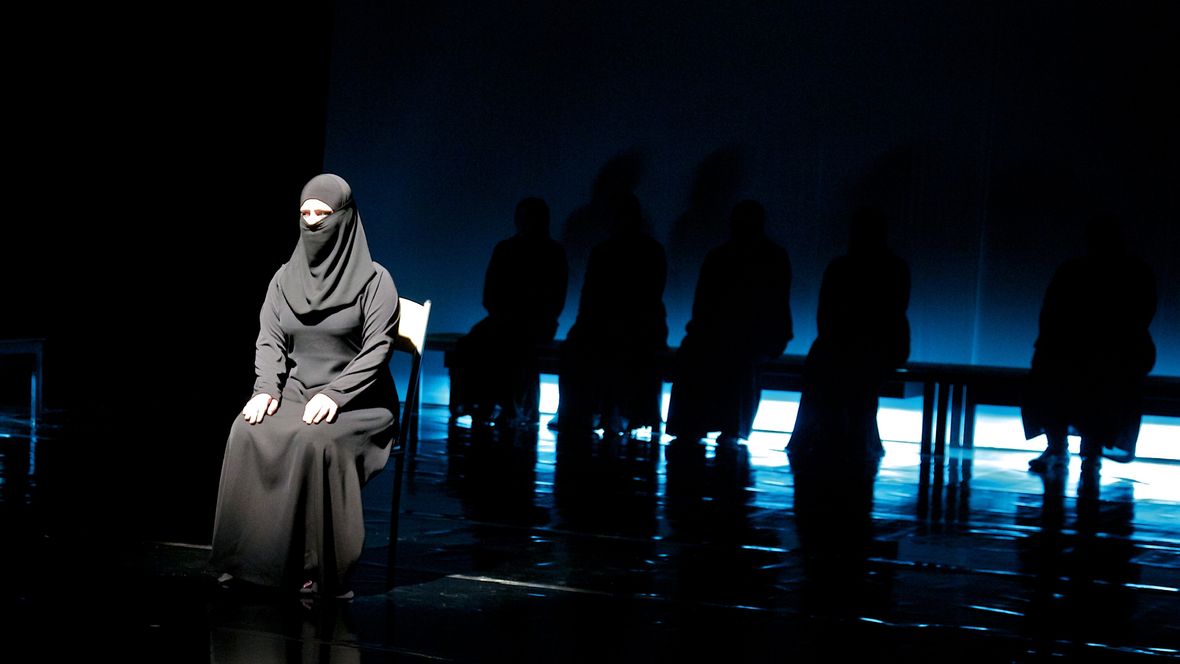From Euripides to “The Archers”: how Syrian refugees stage their stories
written for The Times, (Times 2 Feature Spread), 12 January 2015
I had a chance to discuss the themes of Trojan Women and its resonance for Syria further here, for Index on Censorship.

Syrian Trojan Women onstage. (Photo credit: Lynn Alleva Lilley)
In the Zaatari refugee camp, 15-year-old Reem, a refugee from Syria, thought she’d be safe. Instead she faces a forced marriage to a local Jordanian. Her mother, in tears, insists it’s her best option: if Reem isn’t married off soon, to a man who can provide for her family outside Zaatari, the local gossips may decide she’s no longer a virgin. Next door, Salar’s husband Marwan beats her up to punctuate the boredom. Fadi wants to return to the dangers of Syria to help free a brother from Assad’s dungeons and Jordanian refugee worker Yara wonders aloud why so few of her fellow Jordanians have noticed the suffering on their doorstep.
Reem, Salar, Hala and Yara are fictional — just about. They’re the leading characters in We Are All Refugees, Jordan’s answer to The Archers, a radio soap opera shaking up Jordan’s conscience about the 600,000 Syrian refugees in their midst. But each is based on long-term interviews with real Syrians with only names and minor details changed.
Among the Syrian people who have made it to the Jordanian capital Amman, Zaatari is only whispered about: a place of imprisonment and overcrowding. And in the Zaatari refugee camp everybody lies. It starts with the UN: the High Commission for Refugees, which oversees the settlement, suggests that 85,000 Syrians live in the cramped camp just over the Jordanian border; reliable sources put it closer to 140,000. This means, for its inhabitants, a life without privacy: gossips line the dirt tracks and a trip to the toilet at night takes women past rows of predatory young men. In a shabby Amman apartment I meet Raneem (the women’s surnames have been withheld at their request), a young Syrian with relatives stuck in Zaatari, who is playing the part of Reem. “We Are All Refugees is so important,” she tells me, “because it’s finally a chance to tell the truth.”
We Are All Refugees is on Radio Souriali, a station operated in the US by the Syrian refugee community, but which is broadcast in Jordan. The cast are chiefly refugee amateurs who play characters close to their own experience. Stardust is scattered by the presence of Syrian matinée idols Nawar Bulbul and May Scaff, who are now high-profile political refugees. Raneem herself was married at 17 to a man twice her age whom she had never met. “I wanted to do so much more before I settled down to children,” she tells me. “I do not criticise my husband, but on tonight’s episode, when I cry for Reem, I will be crying for myself.”
I’ve come to Jordan on the trail of the Syrian Trojan Women project, a refugee arts organisation best known for an adaptation of Euripides’ The Trojan Women performed solely by Syrian refugees. That initial performance at the end of 2013 evolved out of six weeks of drama therapy — sessions are continuing — with female survivors of major trauma. Like the last survivors of the sack of Troy, every member of the cast has a story about watching her house destroyed, of burying husbands and brothers or of identifying a child’s corpse.
In exile, they wait for news to filter through. One women who joined the project told her new friends that she grew up with six brothers: by performance night she had learnt that the last surviving two had been killed. In the words of the project’s co-producer, British film-maker Georgina Paget: “You become afraid of asking for people’s news.”
The radio soap We Are All Refugees is the latest project from the producers of that original production, Paget and Charlotte Eagar, a British former foreign correspondent. The mission is the same. “We want to give these women every chance we can to tell their own stories,” says Paget. In Trojan Women, director Omar Abusaada intercut Euripides’ drama with segments of real-life monologue from his participants. Thus, 25-year-old Maysa’s story of being driven away from her family for the last time is juxtaposed with Cassandra’s farewell to her mother Hecuba before she is taken into slavery. In the newer radio drama, classical and real-world references are less overt but underpin the edifice.
Paget has produced a documentary about the project, Queens of Syria. An early edit was shown at the Abu Dhabi film festival on October 30, winning the Best Director from the Arab World award for Yasmin Fedda. Meanwhile, the script for We Are All Refugees, by Syrian playwright Wael Qadour, is collated from dozens of interviews with Trojan Women cast members about the practicalities of refugee life. Euripides’ themes of powerlessness, survival and coercion are omnipresent. For the young women of Syria — like Andromache, Cassandra and Helen before them — exile often means being sold, one way or another, to a new man. Thus, in We Are All Refugees, young Reem is being sold in marriage by her mother.
Eagar says that she developed the plotline after a dispiriting visit to Zaatari: “One woman said to me: ‘No one has anything to do in the camp; we all know each other’s business.’ She was scared her daughter would be raped going to the toilets at night, but even if she was left unmolested, sometime or another the camp gossip would still decide she was a flirt or a slut.” Marrying off your daughters can seem the only way to keep them safe, even if, like Raneem’s character, they resist bitterly.
Eagar and Paget, both classicists, met in a seminar at the Cannes Film Festival and bonded over the dry jokes in Euripides. Eagar and her husband William Stirling were pitching their work on The Trojan Women and the original plan was for Paget,who now makes films with the likes of Romola Garai and Downton Abbey’s Dan Stevens, to produce a documentary about their play.
Since then, however, it’s been all hands to the pumps as the project develops spin-offs in every direction. The first Trojan Women project was funded by private donations and a combination of these donations and funding from UNHCR supported We Are All Refugees. Now, as well as promoting the film, Eagar and Paget are working to raise £10,000 to broadcast an English-language adaptation of We Are All Refugees, which might involve training groups of Syrian refugees in the UK or US.
“Thousands of years later, everyone knows about the pain of the women of Troy. Even in Syria I had heard of them,” says Fatima, who left the city of Homs shortly before the forces of Bashar al-Assad launched their brutal three-year starvation siege. “But I want everyone to know about the siege of Homs too, whether by film, theatre or radio. Maybe the radio will last longer than the play, though film lasts longest.”
Radio, however, can reach places that theatre can’t. Throughout the drama project, the producers have faced daily negotiations with husbands and fathers to maintain permission for their female relatives to participate. An on-site crèche to alleviate childcare responsibilities has helped persuade husbands, as have the expenses the actresses receive for performing (the exact amounts have not been disclosed owing to local sensitivities about paying Syrian refugees for working in Jordan). But in more traditional households Radio Souriali remains women’s most constant contact with the outside world, even when the limits of “home” are the walls of a dank basement or a tent in a refugee camp. That’s one reason why the radio soap includes a plotline about domestic violence: characters list the support options available for a beaten wife.
Not every Syrian patriarch is a burgeoning Bluebeard, of course. In the Amman suburbs I meet 23-year-old Sham, living with her family of ten in a three-room basement. Her father, Shareff, is a liberal lawyer from Al Sayedah Zeinab, just outside Damascus, who jumped at the prospect of a project to stimulate his clever, confident daughter, a girl so sharp she now speaks decent Japanese, picked up from her love of manga cartoons and horror films.
Four years ago Sham was studying for an engineering degree. A few days after I met her she posts a photograph of Damascus on Facebook, the central streets lit up by Christmas lights for the shopping season. To me it looks no different from Regent Street in December, except perhaps a tad more elegant. Sham’s life was once like mine: urban, educated, comfortable. Now she says: “I don’t know what the future will hold. I don’t know where I will live, how I will work, who I will ever see again.”
Pages: 1 2






